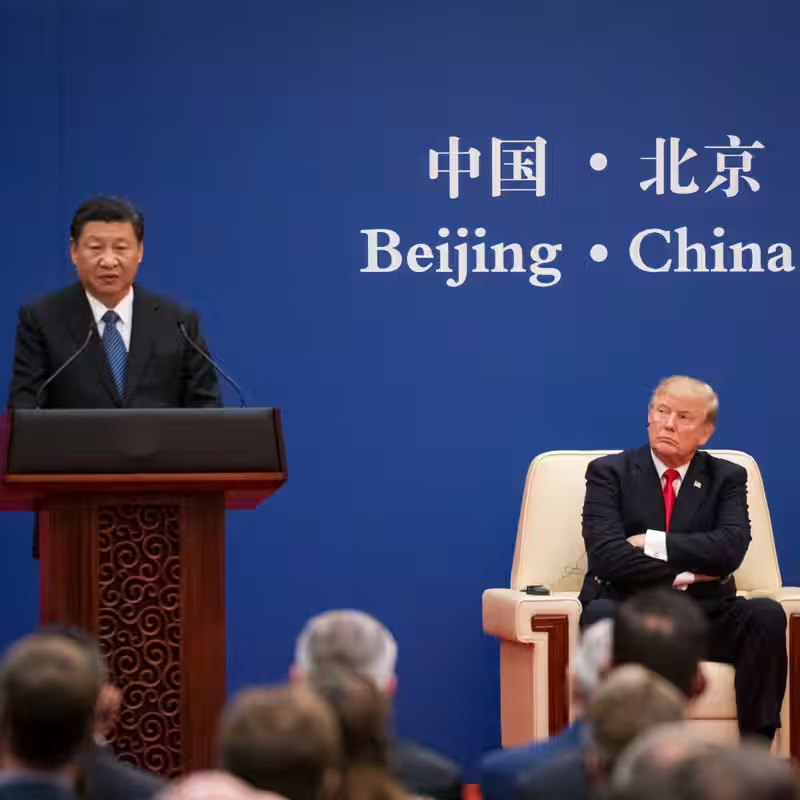How Beijing Is Balancing Nationalist Fury and Backchannel Diplomacy
In a striking blend of old-school propaganda and modern economic brinkmanship, China has unleashed a wave of patriotic messaging across state media—reviving 1950s footage of Mao Zedong declaring, “For as long as they want to fight, we will fight!”—as tensions with the U.S. escalate over rare earth controls, tariffs, and port fees.
But beneath the fiery rhetoric, Chinese officials are quietly signaling they’re still open to talks with President Trump, revealing a calculated dual-track strategy: rally domestic support while keeping the door ajar for de-escalation.
Trade War 2.0: From Cooking Oil to Rare Earths
The latest flare-up began when Beijing announced sweeping new licensing rules for rare earth exports—critical minerals used in everything from fighter jets to electric vehicles. The U.S. responded with threats of 100% tariffs on Chinese goods and even floated banning imports of Chinese cooking oil.
China retaliated with port surcharges on U.S. vessels, antitrust probes into American tech firms, and sanctions on shipping subsidiaries. The result? Global markets wobbled, supply chains tensed, and a planned Xi-Trump summit now hangs in the balance.
Why Mao’s Voice Is Back on Chinese TV
State outlets like CCTV and the Beijing Daily have flooded airwaves and social feeds with historical clips and nationalist editorials framing the conflict as an existential test of China’s resilience.
“Chinese people increasingly understand that a single blow is enough to prevent a hundred blows,” wrote commentator Chao Xing—a clear nod to Beijing’s rare earth leverage.
Yet experts say this isn’t blind nationalism. It’s strategic messaging designed to shore up public confidence amid economic headwinds: deflation, youth unemployment, and a property sector in freefall.
The Tightrope Walk: Hawkish Rhetoric vs. Quiet Outreach
Despite the Mao montages, Chinese officials have notably avoided calling Trump names or invoking Cold War analogies—a sharp departure from the “wolf warrior” diplomacy of past years.
“They don’t want to box themselves in,” said Dali Yang, a political scientist at the University of Chicago. “Once public sentiment is fully mobilized, it becomes harder to back down without losing face.”
Indeed, even as state media brands U.S. tech restrictions as “economic suppression,” the Ministry of Commerce insists the rare earth rules are “not a ban” but a “legal licensing system”—and that there’s still “vast room for cooperation.”
What China Really Wants
Analysts agree: Beijing’s endgame isn’t war—it’s negotiation leverage.
- Force U.S. concessions on chip export controls
- Secure relief from Trump’s 145% tariffs
- Protect its access to global markets amid de-risking trends
“Everything is negotiable,” said Xu Hongcai of the China Association of Policy Science Research. “If you back down, then they’ll definitely be loosened.”
The Domestic Calculus
For Xi Jinping’s government, stoking patriotism also serves a domestic purpose: redirecting public anxiety away from economic woes and toward a unifying external rival.
“It helps frame the moment as another stress test for China’s system,” said Lizzi C. Lee of the Asia Society Policy Institute. “But the risk is that each round of nationalist excitement narrows the space for compromise.”
What’s Next?
With both sides posturing ahead of a potential November summit, the world watches closely. Will Trump follow through on his 100% tariff threat? Will China ease rare earth licensing for U.S. allies? Or will the two superpowers slide into a full-blown economic decoupling?
One thing is certain: in this high-stakes game, Mao’s ghost is just the opening act.
Sources
The New York Times: “China Fans Patriotic Sentiment as Trade War With U.S. Heats Up”




